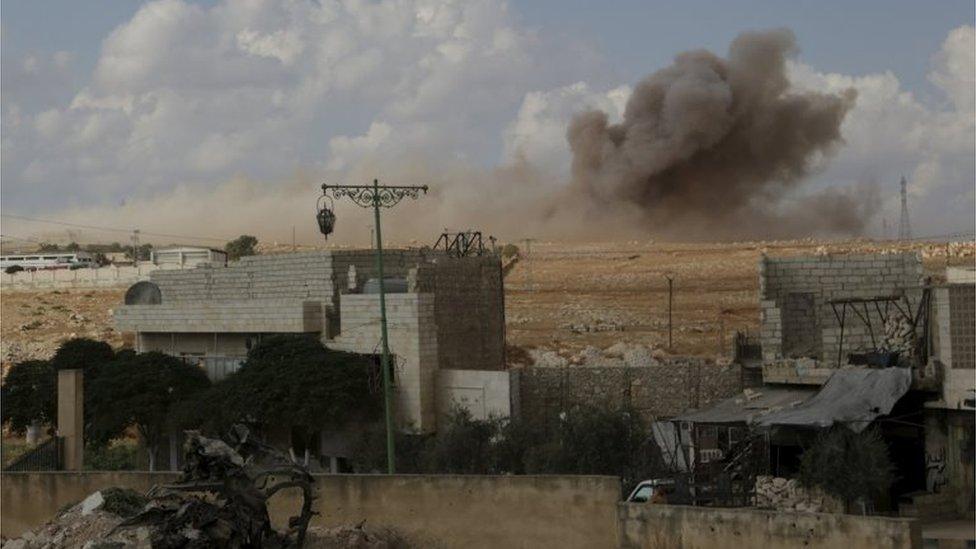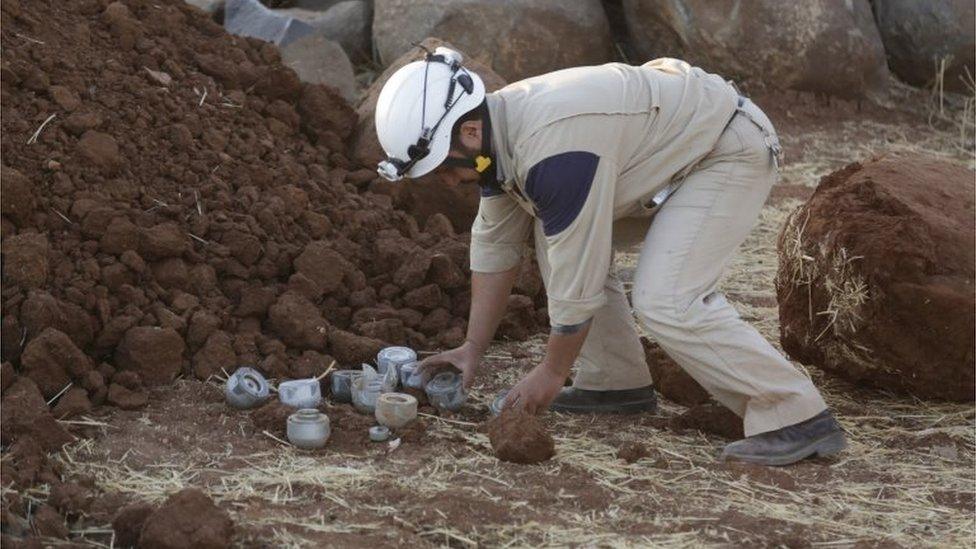Syria crisis: Nato renews pledge amid Russia 'escalation'
- Published
BBC's Quentin Sommerville: "Syria's new ground war has only just begun"
Nato has renewed assurances to defend allies in view of the "escalation of Russian military activities" in Syria, the alliance's secretary-general says.
Jens Stoltenberg said defence ministers had decided to boost response forces to be able to deploy troops speedily.
Nato member Turkey has complained that Russian jets have violated its airspace recently.
Russia has used cruise missiles as well as air strikes in Syria. The Nato chief said Moscow's position was "unhelpful".
Announcing the doubling of the size of the Nato Response Force to 40,000, Mr Stoltenberg said: "All of this sends a clear message to all Nato citizens. Nato will defend you, Nato is on the ground, Nato is ready."
He also urged Moscow to stop backing Syrian President Bashar al-Assad.

Analysis: Jonathan Marcus, BBC defence correspondent
Jens Stoltenberg spoke of "a troubling escalation in Russia's military activities in Syria". Moscow's support for the Assad regime, he insisted, was not a constructive policy. While there's been plenty of condemnation of Moscow here in Brussels, Nato has few options to influence Russian behaviour.
It stands ready to assist Turkey to maintain the integrity of its airspace if requested and Nato is reviewing its naval presence in the eastern Mediterranean, where the Russians already have a small naval flotilla off the Syrian coast.
Vladimir Putin's more assertive stance - first in Ukraine and now in Syria - continues to worry Nato members who share borders with Russia.
More analysis:
Gulf 'steps up' arms to Syria rebels - Saudi Arabia's responds to Russian air strikes
What is Russia's endgame in Syria? - Defeat anti-Assad rebels and be an equal at peace talks
High-stakes gamble - Incursions highlight the risk of a clash
What can Russia's air campaign achieve? - Why should Russia be able to do any better than the US-led coalition?

Moscow denies Western accusations that it has mainly targeted Assad opponents, insisting its strikes have hit the infrastructure of the so-called Islamic State (IS) and other militant groups.
But a Saudi government official told the BBC that in response to the Russian air strikes in Syria, it was stepping up its supply of weaponry to three anti-Assad rebel groups there.
The official said the Free Syrian Army, Jaysh al-Fatah and Southern Front would get increased supplies of modern, high-powered weaponry, including guided anti-tank weapons.
IS militants have seized swathes of territory in Syria and Iraq.
A US-led coalition has been carrying out air strikes against IS fighters in both Syria and Iraq for months. But Western countries support rebels who have been fighting to oust Mr Assad since 2011.

The Russian air strikes had "weakened" IS, Syrian Army Chief of Staff Gen Ali Abdullah Ayoub said on Thursday, enabling the army to start a "big attack" to retake towns and villages.
Heavy fighting was reported in areas of Idlib, Hama and Latakia provinces, where a coalition of rebels that includes the Nusra Front operates.
Government-backed troops had moved into the key Ghab plain area, the UK-based Syrian Observatory for Human Rights monitoring group said.
In other developments:
Russia's defence ministry, quoted by the Interfax news agency, says the Russian air force hit 27 targets overnight - and that they all belonged to IS
Ukraine's President Petro Poroshenko tells the BBC that "Russia wants to create a belt of instability from Syria to Ukraine"
'Wrong strategy'
Nato ministers met in Brussels amid a deepening sense of crisis, says BBC defence correspondent Jonathan Marcus.
The ministers also addressed increased concern among Baltic member states following Russia's involvement in eastern Ukraine.
The BBC's Jonathan Marcus examines the increasingly risky air war over Syria
The UK is to station about 100 troops in Estonia, Latvia and Lithuania amid tensions with Moscow. It is also sending 25 soldiers to a training mission in Ukraine.
Mr Stoltenberg also announced the creation of new Nato HQ offices in Hungary and Slovakia.
Under Article 5 of Nato's Washington Treaty, external, an attack on one member is considered an attack on all. This principle of collective defence commits them to protect each other.
On Wednesday, Russia said it had launched missile strikes against IS from warships in the Caspian Sea - about 1,500km (930 miles) away.

Analysts say Russia is predominantly using non-precision-guided munitions in Syria

A civil defence member in Idlib is shown here collecting unexploded cluster bombs, activists say
Russia's foreign ministry also said Moscow was willing to establish contact with the Free Syrian Army to discuss fighting IS "and other terrorist groups".
But US Defence Secretary Ash Carter said coalition forces fighting IS in Syria would not co-operate with Russia.
"We believe Russia has the wrong strategy," he said.
Mr Carter warned the strategy would "have consequences for Russia itself, which is rightly fearful of attacks... in coming days, the Russians will begin to suffer from casualties". He did not elaborate.
Russia's air campaign has also raised fears of accidental contact between Russian warplanes and those of the US-led coalition which have been targeting IS for the past year.
Pentagon officials revealed they recently had to carry out at least one "safe separation" manoeuvre to avoid a US jet coming too close to a Russian aircraft over Syria.
The Syrian civil war began with an uprising against President Assad in 2011 that was brutally put down.
It has since deteriorated into fighting between pro-government forces and various rebel groups - some of which also fight each other.
